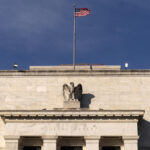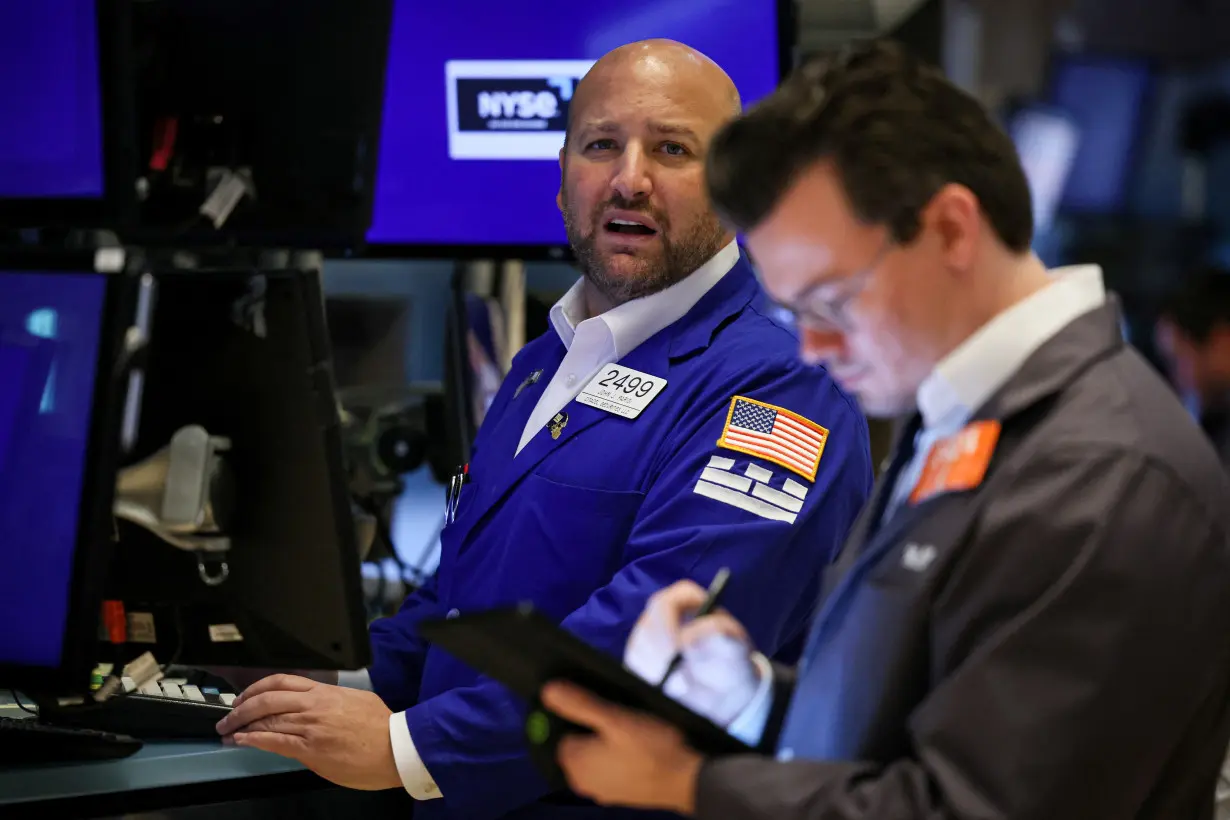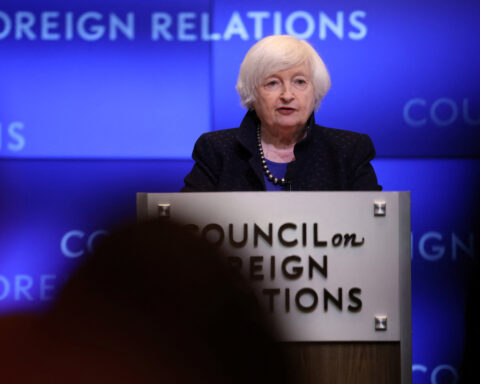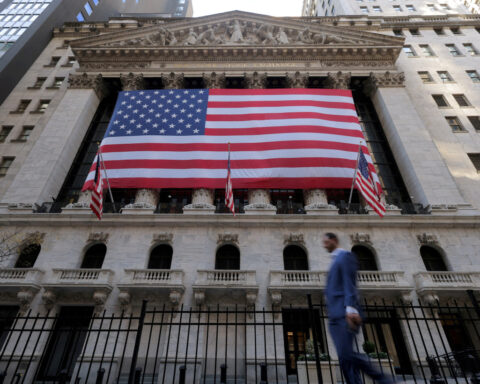By Sinéad Carew, Shashwat Chauhan and Ankika Biswas
(Reuters) - The S&P 500 and the Nasdaq closed lower on Friday as deteriorating consumer sentiment data and the Middle East conflict soured investors on riskier bets and overshadowed upbeat quarterly earnings from some of the largest U.S. banks.
Wall Street's three major indexes opened higher but lost ground after a preliminary reading on U.S. consumer sentiment showed a sharp fall in October. The Dow managed a small gain.
Investors were also monitoring news out of the Middle East. On Friday Israel said it carried out raids inside the Gaza Strip, its first announcement of ground operations aimed at Hamas fighters after their deadly rampage in Israel. The United Nations said Israel's call for Gaza civilians to leave was impossible "without devastating humanitarian consequences."
U.S. Treasury prices rose as investors looked for safety while the price of U.S. crude oil settled up 5.8%.
"This signals more of a risk off-sentiment," said Lauren Goodwin, economist and portfolio strategist at New York Life Investments. The moves in bonds, equities and oil reflect worries about deteriorating consumer sentiment, the global economy and geopolitical conflict, she added.
At this stage of the economic cycle when data has been good but is "expected to deteriorate over the next several months," Goodwin said, "shifts in leadership are incredibly common and no one market narrative tends to last for more than a couple of days at a time."
However, unless there is a major escalation in the Middle East war the strategist said she did not expect Friday's mood to be "indicative of the beginning of a troubled market."
The Dow Jones Industrial Average rose 39.15 points, or 0.12%, to 33,670.29, the S&P 500 lost 21.83 points, or 0.50%, at 4,327.78 and the Nasdaq Composite dropped 166.99 points, or 1.23%, to 13,407.23.
However, for the week the S&P 500 registered a 0.45% gain for its second weekly advance in a row. The Nasdaq fell 0.18% for the week. The Dow showed a 0.79% gain, snapping a two-week losing streak.
Among the S&P's 11 major industry sectors energy led gains with a 2.3% advance as oil prices rose. Defensive sectors such as utilities, up 1%, and consumer staples, adding 0.8%, were also top gainers.
Other safe-haven assets such as gold rallied.
Shares in JPMorgan Chase, Wells Fargo and Citigroup rose after their quarterly profits trounced analysts' estimates with help from higher interest rates. Wells Fargo rose 3% and JPMorgan closed up 1.5%, but Citigroup lost steam, ending down 0.2%.
The S&P 500 Banks index pared gains as the day wore on to close up 0.6% after rising as much as 3.4% to a three-week high.
Federal Reserve Bank of Philadelphia President Patrick Harker said he believes the central bank is likely done with its rate-hiking cycle as price pressures have eased.
Among individual stocks, asset manager BlackRock fell 1.3% after posting a sharp drop in quarterly net inflows.
UnitedHealth advanced 2.6% after beating third-quarter profit estimates.
Dollar General finished up 9% after the discount store retailer brought back former CEO Todd Vasos to replace Chief Executive Jeff Owen.
Boeing ended down 3% after the planemaker and Spirit AeroSystems expanded the scope of their ongoing inspections of a production defect affecting 737 Max 8 aircraft. Spirit's shares lost 0.9%.
Declining issues outnumbered advancers on the NYSE by a 1.56-to-1 ratio; on Nasdaq, a 1.68-to-1 ratio favored decliners.
The S&P 500 posted 12 new 52-week highs and 20 new lows; the Nasdaq Composite recorded 28 new highs and 335 new lows.
On U.S. exchanges 10.06 billion shares changed hands compared with the 10.37 billion average for the last 20 sessions.
(Reporting by Sinéad Carew, Shashwat Chauhan and Ankika Biswas in Bengaluru; Editing by Shounak Dasgupta, Anil D'Silva, Shinjini Ganguli and Richard Chang)

 Edmunds highlights the top car-tech trends from CES 2025
Edmunds highlights the top car-tech trends from CES 2025
 Joann files for bankruptcy — again
Joann files for bankruptcy — again
 German economy, Europe’s largest, shrinks for second straight year
German economy, Europe’s largest, shrinks for second straight year
 Comoros ruling party wins parliamentary elections, opposition rejects results
Comoros ruling party wins parliamentary elections, opposition rejects results
 Sweden seeks to change constitution to be able to revoke citizenships
Sweden seeks to change constitution to be able to revoke citizenships
 Confused about all the tax changes in the past decade? Just wait
Confused about all the tax changes in the past decade? Just wait
 US inflation likely remained elevated last month, threatening interest rate cuts
US inflation likely remained elevated last month, threatening interest rate cuts
 Coors Light is changing its name
Coors Light is changing its name
 Tiger Woods’ son Charlie chuckles while watching his dad suffer heavy defeat in TGL debut
Tiger Woods’ son Charlie chuckles while watching his dad suffer heavy defeat in TGL debut
 Bayern Munich signs US youngster Bajung Darboe from LAFC
Bayern Munich signs US youngster Bajung Darboe from LAFC








